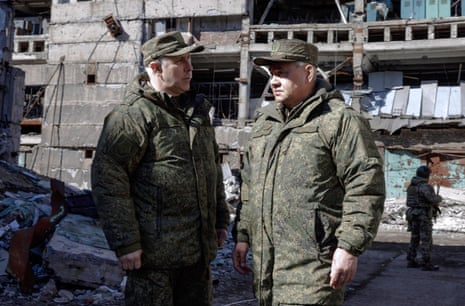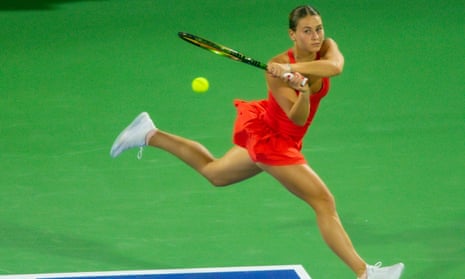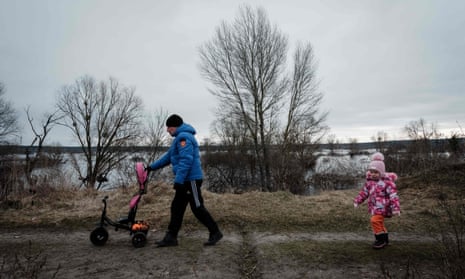Ukrainian forces appear to be “conducting a limited fighting withdrawal” in eastern Bakhmut but continue to inflict high casualties on the advancing Russian forces, the US-based Institute for the Study of War says in its latest update.
Though the think tank says it is still too early to tell what Ukraine’s intentions are, the defence of Bakhmut “remains strategically sound” and that it may be pursuing a “gradual fighting withdrawal to exhaust Russian forces through continued urban warfare”.
Russian forces are unlikely to quickly secure significant territorial gains when conducting urban warfare, which usually favors the defender and can allow Ukrainian forces to inflict high casualties on advancing Russian units—even as Ukrainian forces are actively withdrawing.
The ISW said Russian forces will still need to fight through through Bakhmut city centre on the western bank of the Bakhmutka River, which is heavily defended and will favour Ukrainian forces.
Urban warfare in Bakhmut may further degrade already exhausted Russian mixed forces in a fashion similar to that caused by Ukraine’s fighting withdrawal from the Severodonetsk-Lysychansk line, which effectively ended Russian offensive operations in Luhansk and Donetsk oblasts in the summer of 2022.
The air alarm that was declared across all of Ukraine earlier has ended.
Most of Ukraine’s winter grain crops – winter wheat and barley – are in good condition and could produce a good harvest, Ukraine’s academy of agricultural science was quoted as saying on Monday.
“The analysis of the viability of winter wheat … showed that the vast majority of plants were in relatively good condition,” the APK-Inform consultancy quoted a report by the academy as saying, despite Russia’s invasion of Ukraine.
Reuters reports the winter wheat area sown for the 2023 harvest decreased to about 4.1m hectares from more than 6m sown a year earlier as a result of Russia’s fullscale invasion of Ukraine on 24 February last year.
Of the winter wheat sown last year, only 4.9m hectares were harvested in Ukrainian-controlled territory, as Russian forces occupied some areas.
Ukraine’s wheat harvest declined to 20.2m tonnes in 2022 from 32.2m tonnes in 2021. Overall grain output fell to around 54m tonnes from a record 86m in 2021.
Suspilne, Ukraine’s state broadcaster, is reporting that overnight “Russian troops launched a rocket attack on Kramatorsk and destroyed a school”, and that 15 apartment buildings were also damaged.
The claim has not been independently verified.
Oleksandr Syenkevych, mayor of Mykolaiv, has published to Telegram to say that the electricity, water and heating systems in the city are all functioning. He also writes that all public transport is running.
The BBC Russian service reports that “for the third day in a row”, Russia’s defence minister Sergei Shoigu is in the Russian occupied area of Ukraine, adding more details to earlier reports. [See 6.13 GMT]
The BBC writes:
In Mariupol, Shoigu “inspected the readiness of already commissioned facilities and the progress of work on the sites of buildings and structures under construction.”
The list of objects that Shoigu allegedly visited includes a medical centre, an emergency centre and “a new microdistrict of 12 five-story residential buildings.”
On Saturday, the Russian military department claimed that the minister visited the “forward command post” of one of the formations of the Vostok group of troops in the South Donetsk direction, where the commander of the group Rustam Muradova reported to him. On Sunday, there was a report about a meeting between Shoigu and the leaders of other groups at the “headquarters of the combined group of Russian troops.”
The exact geographical points of Shoigu’s trip were not indicated.

The air alert has been extended across all of Ukraine.
An air alert has just been declared across several regions of Ukraine including Mykolaiv, Dnipro, Zaporizhzhia, Odesa and Kherson in the south, as well as in Lviv in the west.
It was Boris Johnson who declared, in November 2021, four months before Russia’s invasion of Ukraine, that “the old concepts of fighting big tank battles on the European landmass … are over”. Today, dozens of destroyed Russian tanks dot Ukraine’s eastern Donbas fields near Vuhledar, smashed, rusting emblems of a traditional heavy warfare that has returned to Europe.
Events have moved fast since Russia invaded last February, but it is worth restating how far planning for conventional war had gone out of fashion before then. Although it was recognised that Russia was a threat, the dominant military thinking was that the goal of authoritarian regimes was “to win without going to war”, as then chief of general staff Sir Nick Carter said in September 2020.
It was not just a UK assumption; the idea was widespread that future conflicts would be economic, or fought in cyberspace; by mercenaries or simply deniably in the way Russia’s first incursions into Ukraine in 2014 were led by separatist rebels infiltrated by Moscow’s forces. War, in short, would be less bloody – and much cheaper.
For more on how these and other assumptions have been upended by the Russian invasion of Ukraine, read the full story by Dan Sabbagh.
Russia’s premier tank force is expected to be re-equipped with Soviet-made T-62 tanks first fielded in 1954 to make up for combat losses, the UK Ministry of Defence says.
In its latest update the ministry says there is a “realistic” possibility” that the 60-year-old tanks will be supplied to units including the 1st Guards Tank army, which had been expected to receive the next-generation T-14 Armata main battle tank from 2021.
The ministry said approximately 800 T-62s have been pulled from storage since 2022 and have been retrofitted for use in the conflict but lack modern explosive reactive armour.
Ukraine’s Marta Kostyuk won her first WTA title Sunday with victory over Russia’s Varvara Gracheva and dedicated it to her country and “all the people who are fighting and dying”.
The 20-year-old Kostyuk collapsed to the court sobbing after winning the final of the ATX Open in Austin, Texas 6-3, 7-5.
The 52nd-ranked Kostyuk told the victory ceremony:
Being in the position that I am in right now, it’s extremely special to win this title.
I want to dedicate this title to Ukraine and to all the people who are fighting and dying right now.
After applause and cheers, Kostyuk added: “Obviously it’s a very special moment, no matter when it happens.”

Kostyuk has previously been outspoken about the tennis world’s response to the Russian invasion of her homeland, saying anti-war platitudes weren’t enough.
At the Australian Open in January, Kostyuk said it had been “very upsetting” to see Novak Djokovic’s father, Srdjan, posing alongside a Russian flag with President Vladimir Putin’s face on it.
Kostyuk refused to shake hands at the US Open with Victoria Azarenka of Belarus.
Russia’s invasion of Ukraine in February last year saw them and allies Belarus become outcasts in world sport.
- AFP
A British-led £520m international fund to provide fresh weapons for Ukraine and intended to be “low bureaucracy” has been plagued by delays, with only £200m allocated amid warnings that the rest of the funding will not provide arms at “the front until the summer”.
Bidders complain that the process, run by the UK’s Ministry of Defence, working with six other European countries, has been frustrating with deadlines missed – and the MoD conceded that awarding contracts “inevitably took time”.
Launched last August, the International Fund for Ukraine was intended to be “a flexible low-bureaucracy fund” that would provide new kit, training and money for repairs for Ukraine’s armed forces as Kyiv battles the Russian invasion.
For more on how a frustrating bureaucratic process is impeding weapons supplies for Ukraine, read the full report by Dan Sabbagh.
Three Ukrainian missiles have allegedly been shot down by air defence in Russia’s Belgorod region overnight.
Vyacheslav Gladkov, mayor of the Belgorod region, confirmed the strike in a post to his Telegram channel and said authorities were working to understand what had occurred.
One man has allegedly suffered shrapnel wounds to his arm and been taken to hospital by ambulance. Additional damage had been done to powerlines and the facades of nearby buildings.
Russian defence minister Sergei Shoigu has visited Mariupol, the city in Ukraine’s eastern Donetsk region captured by Russian forces last year after a months-long siege, the defence ministry said on Monday.
- Reuters
Within the first hours of Russia’s invasion of Ukraine on February 25, 2022, the Ukrainian armed forces blew up a Soviet-era dam on the Irpin river to slow the Russian advance on Kyiv by flooding the surrounding area, turning it into a swampy quagmire.
A year on, the town of Demydiv is reeling from the flood that struck over 60 houses in the area.
Here are a few images from the town as residents grapple with their flooded community, the effects of winter and the ongoing war.




- AFP/GETTY
Ukrainian forces repelled more than 95 attacks by Russian forces on Sunday in several areas of Luhansk and Donetsk.
According to the latest update by the General Staff of the Armed Forces of Ukraine, Russian forces launched 27 air strikes and four missile strikes in the last 24 hours and continue to target civilian infrastructure.
It reports that assaults on Bakhmut and surrounding settlements remain ongoing with 21 settlements in Donetsk enduring hostile shelling and that Russian forces have been moved near Nova Kakhovka in Kherson and in Crimea as a feint. It is believed this has caused frustration among Russian troops due to fuel shortages and a lack of faith in the effectiveness of such a manoeuvre.
Meanwhile, the Ukrainian airforce conducted 12 strikes on Russian forces, with artillery and missile forces striking three control points, four “focus areas” and one air defence system.
It is also claimed that the Russian military has set up a base in Volnovakha in the Donetsk region where students from a local technical school have been forced to repair damaged equipment and vehicles.
Russia’s failure to advance according to its stated timeframes is likely to lead to increasing frustration amongst the wars strongest supporters, the Institute for the Study of War says.
The ISW says the grinding campaign to capture Bakhmut has forced millbloggers to shift to more conservative expectations for advancing Russian troops informed by “nine months of ‘highly attritional, slow Russian advances in the Bakhmut.”
Despite these lowered expectations the ISW says cost of taking Bakhmut and stalling advances elsewhere “suggests that Russian campaigning to capture all of Donetsk Oblast would be a year’s-long effort’”.
Russian forces currently do not have the manpower and equipment necessary to sustain offensive operations at scale for a renewed offensive toward Kramatorsk and Slovyansk, let alone for a years-long campaign to capture all of Donetsk Oblast. Meaningful Russian offensives around Vuhledar or elsewhere in western Donetsk Oblast are also highly doubtful.
Russia will have to mobilize considerably more personnel and fundamentally transform its military industry to be able to support such operations. The Russian military‘s likely continued failure to achieve a decisive victory in Donetsk Oblast will likely draw increasing ire from Russia’s ultranationalist pro-war community.
Ukraine’s defence of Bakhmut is inflicting heavy losses on Russian forces, setting the stage for a future Ukrainian counteroffensive, according to the latest update by the Institute for the Study of War.
The attrition experienced by Russian forces in Bakhmut, and stalling offensives elsewhere, mean “the Russian military will likely struggle to maintain any subsequent offensive operations for some months”, the think tank says.
The ISW says the “significant numbers” of mobilised personnel near Vuhledar and in other operations suggest “Russian forces likely lack the capability to further reinforce the Bakhmut area significantly without pulling forces from another area of the front due to the lack of untapped reserves”.
Even if the Russian military take Bakhmut, the ISW says it would likely not be able to capitalise on this win and, combined with the “stalling Russian offensive” in Luhansk, circumstances are “likely setting robust conditions for a future Ukrainian counteroffensive”.
The Russian effort against Bakhmut does not further the Russian military’s operational or strategic battlefield aims, and significant Ukrainian defenses in the surrounding area undermine any tactical significance that capturing Bakhmut likely has for Russian forces. Ukrainian forces will likely have a window of opportunity to seize the battlefield initiative and launch a counteroffensive when the Russian effort around Bakhmut culminates either before or after taking the city.
Ukrainian forces appear to be “conducting a limited fighting withdrawal” in eastern Bakhmut but continue to inflict high casualties on the advancing Russian forces, the US-based Institute for the Study of War says in its latest update.
Though the think tank says it is still too early to tell what Ukraine’s intentions are, the defence of Bakhmut “remains strategically sound” and that it may be pursuing a “gradual fighting withdrawal to exhaust Russian forces through continued urban warfare”.
Russian forces are unlikely to quickly secure significant territorial gains when conducting urban warfare, which usually favors the defender and can allow Ukrainian forces to inflict high casualties on advancing Russian units—even as Ukrainian forces are actively withdrawing.
The ISW said Russian forces will still need to fight through through Bakhmut city centre on the western bank of the Bakhmutka River, which is heavily defended and will favour Ukrainian forces.
Urban warfare in Bakhmut may further degrade already exhausted Russian mixed forces in a fashion similar to that caused by Ukraine’s fighting withdrawal from the Severodonetsk-Lysychansk line, which effectively ended Russian offensive operations in Luhansk and Donetsk oblasts in the summer of 2022.
Hello and welcome back to our live coverage of Russia’s war in Ukraine – this is Royce Kurmelovs bringing you the latest developments.
An update from the Institute for the Study of War (ISW) on Monday morning suggests Ukrainian forces may be conducting a “limited fighting withdrawal” from eastern Bakhmut. Ukrainian forces are continuing to inflict high casualties against advancing Russian units but ISW says it is still too early to know how the situation is developing and the defence “remains sound”.
During his nightly address, Ukrainian president Volodymyr Zelenskiy hailed fighters in the Donbas region, describing the defence of Bakhmut as “one of the toughest battles. Painful and challenging”. Ukraine’s armed forces continue to hold on in Bakhmut but are coming under increasing pressure as Russian forces move to contest lines of communication and prevent resupply.
On Sunday Zelenskiy said the armed forces had repelled “more than 130 enemy attacks”.
Meanwhile, a Ukrainian special forces unit, known as Kraken, has taken credit for an attack on a Russian observation tower in the city of Bryansk which was destroyed using a kamikaze drone. There were also reports of air raids overnight with anti-aircraft batteries responding in Kiev, Dnipropetrovsk, Zaporizhzhia and Donetsk.
In other developments:
Zelenskiy also said “the world was strong enough to punish Russia for the war”. Ukraine would spend the next six months working to shore up the country’s energy supply against Russian attack, he said.
Exiled mayor of Melitopol, Ivan Fedorov, has claimed “hundreds” of Russian solders were killed in a Ukrainian strike on the city. There was no confirmation from Ukraine’s Ministry of Defence and the Guardian could not independently verify the claim.
The Russian army hit a command centre of the Ukrainian forces’ Azov regiment in the south-eastern Zaporizhzhia region, the Russian defence ministry said on Sunday. The Guardian could not independently verify this.
Turkish foreign minister Mevlüt Çavuşoğlu said on Sunday that Ankara was working hard to extend the UN-backed Black Sea grain initiative. A Russian foreign ministry spokesperson indicated Moscow was unhappy with aspects of the deal, which allowed Ukraine to export grain from ports blockaded by Russia following its invasion.
German chancellor Olaf Scholz told CNN it was “necessary” for Russian president Vladimir Putin to understand he will not win the Ukraine war, so negotiations to end the conflict can begin. “If you look at the proposal of the Ukrainians, it is easy to understand that they are ready for peace,” he added.
The death toll from a Russian missile strike that hit a five-storey apartment block in the southern Ukrainian city Zaporizhzhia on Thursday has risen to 13, a local official said on Sunday.
A woman and two children were killed in Russian mortar shelling of a village in the southern Ukrainian region of Kherson, the head of Ukraine’s presidential office said on Sunday.
Ukraine MP Ivanna Klympush-Tsintsadze told Sky News on Sunday that tens of thousands of Ukrainian children could have disappeared in what she described as “genocide”. Klympush-Tsintsadze said the children were potentially deported to Russia.
https://news.google.com/rss/articles/CBMilAFodHRwczovL3d3dy50aGVndWFyZGlhbi5jb20vd29ybGQvbGl2ZS8yMDIzL21hci8wNi9ydXNzaWEtdWtyYWluZS13YXItbGl2ZS11a3JhaW5lLWxpa2VseS1tYWtpbmctbGltaXRlZC10YWN0aWNhbC13aXRoZHJhd2FsLWluLWJha2htdXQtYW5hbHlzdHMtc2F50gEA?oc=5
2023-03-06 07:44:00Z
1798550053
Tidak ada komentar:
Posting Komentar